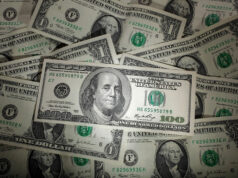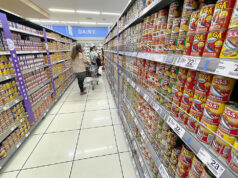BSP sees July inflation still past 5%

PRICES of widely used goods likely sustained their overall increase past an official full-year target in July, the Bangko Sentral ng Pilipinas (BSP) said on Tuesday.
The BSP Department of Economic Research said headline inflation likely picked up within a range of 5.1-5.8% last month, coming from a nine-year peak of 5.2% actually clocked in June.
The range compares to the 4.3-5.1% estimate given for last month, surpassing the central bank’s 2-4% target for the fourth straight month.
Inflation clocked in at 2.4% in July 2017. As of end-June, prices have increased by an average of 4.3%, versus the BSP’s 4.5% projection for the entire 2018.
The BSP unit attributed the elevated inflation expectation to a sustained increase in prices across most commodities.
“The increases in electricity rates in Meralco-serviced areas, water rate adjustments in Maynilad- and Manila Water-serviced areas, domestic gasoline and LPG prices, jeepney fares, scheduled increase of the tobacco excise tax, and prices of rice and other agricultural commodities could lead to upward price pressures during the month,” the central bank said in a statement published yesterday.
Manila Electric Co., the country’s biggest power distributor, said bills rose by P0.316 per kilowatt-hour in July due to a higher generation charge, reversing from two straight months of a rate reduction.
The Metropolitan Waterworks and Sewerage System also approved an increase in rates for water concessionaires at P0.99 per cubic meter (/cu.m.) for Manila Water Co., Inc. and P0.06/cu.m. for Maynilad Water Services, Inc., reflecting foreign currency movements.
July also saw fuel pump prices go up overall to mirror movements in world crude oil prices as well as the peso’s continuing general weakness against the dollar. Still, a rollback in domestic diesel prices may have partly offset upward pressures, the BSP said.
The government also approved last month a P1 provisional increase in jeepney fares to help drivers cope with rising fuel costs.
Another P2.50 increase in excise tax per pack of cigarettes also took effect last month, as provided under the Tax Reform for Acceleration and Inclusion law. Together with alcoholic drinks, these so-called “sin” products have seen the biggest year-on-year increase in prices.
At the same time, monsoon rains and three tropical cyclones that hit parts of the country in July wreaked damage to agriculture worth P2.579 billion, according to the National Disaster Risk Reduction and Management Council.
The Philippine Statistics Authority will report July inflation data on Tuesday next week.
If the BSP forecast were realized, it would mean a fresh high for monthly inflation, in line with expectations that price spikes will peak this quarter.
“Going forward, the BSP will continue to keep a watchful eye on the risks to the inflation outlook and will take necessary action to help ensure that inflation expectations remain firmly anchored to the target,” the BSP said.
BSP Governor Nestor A. Espenilla, Jr. has assured that the central bank has kept a firm hand on prices, and is considering “strong follow-through” to two 25-basis-point rate hikes announced in May and June that were designed to help rein in inflation pressures.
Yesterday, Mr. Espenilla assured lawmakers at the House of Representatives that the BSP “stands ready to take decisive monetary policy responses” to keep prices stable. — Melissa Luz T. Lopez



